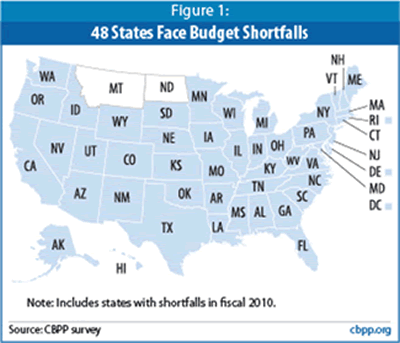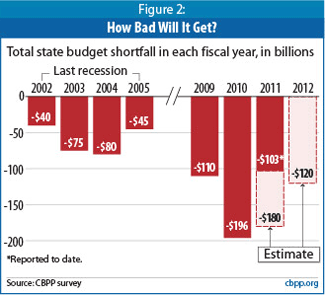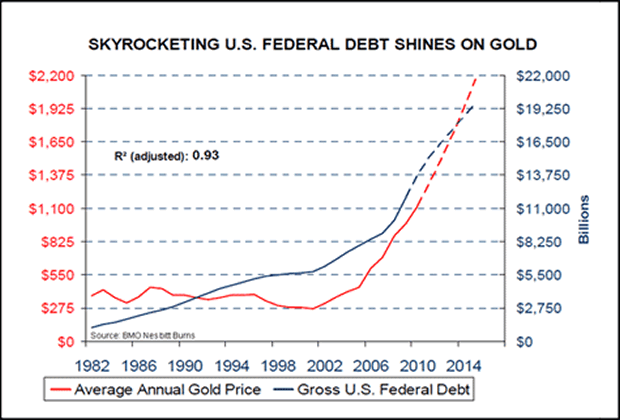Protect Your Wealth From Exploding Debt as States Implode
Interest-Rates / US Debt Apr 06, 2010 - 10:34 AM GMTBy: Sean_Brodrick
 The world is breathing a sigh of relief now that the financial crisis in Greece is “over.” Yeah, right. Greece’s financial misdeeds — the country has racked up a lot of debts it can’t pay — will probably come back to haunt Europe, and soon.
The world is breathing a sigh of relief now that the financial crisis in Greece is “over.” Yeah, right. Greece’s financial misdeeds — the country has racked up a lot of debts it can’t pay — will probably come back to haunt Europe, and soon.
But we in America shouldn’t be too smug, because U.S. states have their own money problems, many of them worse than anything facing Greece — and the problems at home are starting to erupt!
In fact, there are steps you might want to take RIGHT NOW to protect yourself from the financial earthquakes these debt volcanoes could unleash.
Let’s put things in perspective. Greece’s gross domestic product (GDP) is approximately $357 billion. Meanwhile, the state of Illinois has a GDP of around $633 billion — and, on Monday, Fitch Ratings downgraded Illinois’ credit rating and warned of possible further action, leaving the state’s credit on negative watch.
Why? Because Illinois has a $13 billion budget deficit and is careening into a liquidity crisis.
Is Illinois not big enough for you? California is the largest U.S. state with roughly $1.8 trillion in GDP — the eighth largest in the world. That puts it roughly on par with Russia, Spain, or Brazil. How bad are things in California?
- California is wrestling with a $22 billion budget deficit.
- The deficit is expected to get worse, and hit $25 billion in 2012. And that’s a CONSERVATIVE estimate. Other estimates put it over $40 billion.
- Including state pension obligations, California’s debt burden is 37% of its economic output.
- The crisis is so bad, the credit default swaps — or insurance against default — on California general obligation debt now show California’s bonds are at greater risk than the bonds of Kazakhstan, Croatia, Bulgaria and Thailand. That’s right, Kazakhstan! Where Borat comes from!
- The financial situation is so severe that California is paroling prisoners early, slashing what once were deemed essential services, and doing the equivalent of rifling the couch cushions (shifting funds temporarily) to try and bridge the fiscal gap.
 |
Across America, the big picture is just scary. According to the Center on Budget and Policy Priorities, 48 states face shortfalls in their budgets for fiscal year 2010 that total $196 billion or 29% of state budgets — the largest gaps on record.
Experts say 10 states are bordering on insolvency — along with California and Illinois, other states in the hot seat including Arizona, Florida, Michigan, Nevada, New Jersey, Oregon, Rhode Island and Wisconsin. They are all in the soup, financially. And in 2011, many states face revenue gaps as big as or bigger than the ones they are wrestling with this year.
Sure, states have faced budget crises before. But not like this, not in modern history. The last recession saw budget shortfalls that lasted for several years, but they were half the size (or less) of the gaps that states are facing now. Collectively, U.S. states will probably face a shortfall of $180 billion in 2011 and at least $120 billion in fiscal 2012 (the fiscal year starts in July).
 |
States are required to balance their budgets. They’ll probably do this by slashing services and payrolls. As firefighters, police officers and teachers get pink slips, they cut back on their personal spending — which worsens the downward economic spiral.
There are three other options for states:
1) Find a new source of revenue. Most things that can be taxed have been taxed. The big exception is marijuana, a $10 billion a year cash crop. To that you can add the $15 billion a year the U.S. government spends on fighting the war on drugs, much of which is on marijuana eradication or marijuana-related enforcement. California is considering legalizing and taxing marijuana, but since marijuana is illegal on the federal level, good luck with that. Bottom line: There aren’t many new sources of revenue that politicians and voters would be willing to accept.
2) Pass the bill to Uncle Sam. The stimulus package already gave well over $100 billion in direct aid to states, but that money is running out. Governor Schwarzenegger has already asked Uncle Sam for more money to bridge the gap and complained bitterly when he didn’t get it.
3) Default on bonds. The risk of this is rising, and that’s why the CDS on California bonds is higher than that of Kazakhstan. If states find their financial burdens unsustainable, they could simply default.
Have states defaulted before? Yes! In the Great Depression, Arkansas defaulted on its debt. But the real blow-out was in 1841 and 1842. That’s when Mississippi, Pennsylvania, Maryland, Arkansas, Louisiana, Michigan, Illinois, Indiana and the then-territory of Florida ALL defaulted on their foreign debts.
To be sure, the United States before the Civil War was more decentralized than it is today. But is that strength or a weakness? If the U.S. lets defaulting states drag it down, that could trigger more problems.
In 1842, the multi-state default dragged the rest of America’s credit into the sewer. Baron James de Rothschild, head of one of Europe’s most prestigious banking families, raged at an American visitor: “You may tell your government that you have seen the man who is at the head of the finances of Europe, and that he has told you that the U.S. Treasury cannot borrow a dollar, not a dollar!”
Municipal debt is even more at risk. In the Great Depression, 16% of municipal bonds defaulted. Another, earlier crisis saw 23% of municipal bonds default! Today, about $5 billion of municipal bonds are in default, with a lot more at risk.
The Crisis of 1842 didn’t end until the U.S. discovered gold in California in 1848. I don’t think a mother lode discovery is going to happen this time around.
What You Should Do to Protect Yourself
Here are a few things you might consider …
* Avoid state/municipal bonds with too-tempting yields. Today, Americans are piling into municipal and state bonds that offer tempting yields. If you’re tempted, you might want to consider the risks. Especially avoid revenue bonds — bonds backed by income from parking garages, sewers and other projects.
Instead, stick to bonds with excellent credit ratings — short-term Treasuries or some of those corporate bonds I mentioned earlier.
If you want higher yields, consider some of the energy trusts that pay big fat yields. I’ve recommended the best of them in Crisis Profit Hunter. If you do it on your own, be careful. Remember, too high a yield can be a sign that a company is in trouble.
* Put your financial house in order. If you’re financially dependent on state payments, prepare yourself in case those payments are cut in a crisis. And even if you’re not dependent on the state, you should realize that America’s financial crisis is probably not over. We could see another financial crisis that rocks America to its foundations.
Financial preparation is just one of the topics I cover in my new my new book, The Ultimate Suburban Survivalist Guide. You should be using these good times to get ready for the potential bad times.
What if Washington Does Give the States Another Bail-Out?
This is an election year, so another bailout/stimulus package could definitely be on the table. Washington could basically nationalize the budget gaps of the states.
In the long-term, that wouldn’t do much good, because the underlying problem wouldn’t be fixed. But the Good-Time Charlies in Washington specialize in kicking the can down the road. They can’t think beyond the next election.
If that happens, there are two other things you might want to do …
* Buy gold. Gold is an insurance policy against the devaluation of the dollar. And if the U.S. government continues to rack up debts at today’s record pace, that could be a possibility.
The U.S. debt rating is already at risk. Two-year Treasury notes now carry a higher yield than bonds sold by Berkshire Hathaway, Procter & Gamble, Lowe’s and other leading corporations, according to data compiled by Bloomberg. In other words, the market is saying that lending to Uncle Sam is riskier than lending to companies like Berkshire and J&J.
And no wonder. A whopping $2.59 TRILLION in Treasury debt has been sold since the start of 2009. The budget deficit has swelled to a post-World War II-record 10% of the economy!
And history shows that as the amount of U.S. debt goes higher, so does the price of gold …
 |
The relationship between the amount of U.S. debt and the price of gold is pretty clear. I think gold can be bought on pullbacks. It’s a long-term investment, and I prefer physical gold to ETFs like the SPDR Gold Trust Shares.
* Short U.S. Debt. You can do this through a fund that shorts U.S. Treasuries. That fund is called the ProShares UltraShort Lehman 20-Year Treasuries Fund (TBT). It aims to track twice the inverse of the daily performance of the Barclays Capital 20+ Year U.S. Treasury index.
Just be careful — leveraged funds can be very volatile.
The crisis in state debt won’t come to a head overnight — this financial volcano could smolder for a year or more. But don’t sit around waiting for things to happen. These ARE the good times. The hard times are coming. You can protect yourself, profit, and prepare, but you’ve got to start now.
Yours for trading profits,
Sean
This investment news is brought to you by Uncommon Wisdom. Uncommon Wisdom is a free daily investment newsletter from Weiss Research analysts offering the latest investing news and financial insights for the stock market, precious metals, natural resources, Asian and South American markets. From time to time, the authors of Uncommon Wisdom also cover other topics they feel can contribute to making you healthy, wealthy and wise. To view archives or subscribe, visit http://www.uncommonwisdomdaily.com.
© 2005-2022 http://www.MarketOracle.co.uk - The Market Oracle is a FREE Daily Financial Markets Analysis & Forecasting online publication.



